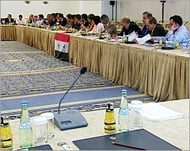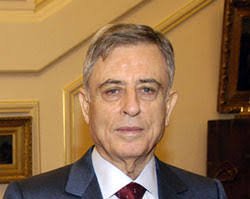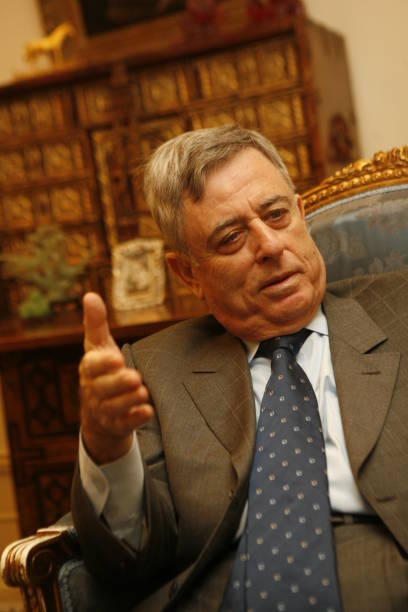In a remarkable step that would increase the pressure on the Syrian regime, especially the internal ones, Syrian opponents, including former Vice President Abdel Halim Khaddam and the General Controller of the Muslim Brotherhood, Ali Sadr al-Din al-Bayanouni, announced yesterday in Brussels the establishment of the “National Salvation Front” in order to change the regime through peaceful means. in Syria
The new front called on “all opposition forces to cooperate, within the framework of the front or with it, in order to achieve the aspirations of our people for change and salvation from the current situation that has weakened Syria in the face of challenges.”
Change in a few months
Khaddam confirmed before the meeting was held that “the Syrian people are tired of the current situation and we expect that many new circumstances will lead to a people’s uprising.”
He predicted “regime change within a few months,” saying that President Bashar al-Assad is committing many mistakes and “falling himself into a hole,” and that the economic and social situation has become increasingly unbearable. He expects that the investigation into the assassination of President Rafik Hariri will directly accuse Assad, which is a restriction that raises concerns. Leadership fall
For his part, Al-Bayanouni said, “This (Syrian) regime has fulfilled all the causes of collapse, and has no popular base. It is isolated internally and is committing mistakes in foreign policy that make it isolated internationally.” He confirmed to Al-Qabas that there are contacts with basic forces inside the country, including Alawites. He explained Obaida Nahhas, Director of the Arab East Institute in London, said that the meeting was attended by forces and figures including Islamists, liberals, leftists, nationalists, and supporters of the Damascus Declaration.
National project for change
The document issued by the meeting in Brussels, under the name 'National Project for Change', indicated that Syria is exposed to two dangers: the first is internal, represented by the regime's policies, and the second is external, 'brought upon the country by improvised and irresponsible decisions'.
The document confirmed that the change project is based on its own strengths, “taking advantage of the changing international and regional climate,” according to multiple mechanisms, including
- Exposing the truth about the tyrannical and corrupt regime to the world to lift the lid on it
- Exposing the policies of Islam and its weakness, and neglecting the principles that the regime follows to maintain its survival
- Intensifying contacts with Arab countries to reveal the suffering of the Syrian people, and expose the flagrant violations of human rights, as well as civil society institutions in the world, as well as human suffering, under the state of emergency, martial laws, and exceptional courts.
Speech until civil disobedience
- Establishing the foundations of a media mobilization discourse undertaken by all opposition factions, to bring the people to a state of civil disobedience.
- The opposition comes together at home and abroad to bring about change and come together on common goals, rejecting all forms of totalitarian thought, welcoming everyone who wants to join the front, emphasizing the essential role of women in society, focusing on preparing the rising generations, and working to address the economic situation in all its aspects.
- The goal of the desired change is to build Syria as a modern civil state, whose political system is based on a social contract, emerging from a democratic constitution that respects pluralism, is based on the peaceful transfer of power, and expels the specter of chaos and civil war, which the regime has always feared.
- Work to get rid of the policy of isolation that has shattered national unity, especially the grave injustice that befell the Kurdish people
Foreign Policy
As for foreign policy, the Front has placed at its top priority the restoration of the occupied Golan, supporting the steadfast people there, and supporting the Palestinian people to restore their full rights in accordance with the relevant United Nations resolutions.
The document also stipulated the necessity of restoring cohesion and fraternal relations with the State of Lebanon, based on common interests and historical relations between the two peoples on the basis of fraternal and good-neighborly relations.
It also stipulated to stop interfering in Arab affairs, and to strive to build Arab solidarity on a solid foundation, by activating cooperation agreements, especially the Arab Common Market.
The Front also stood in solidarity with the Iraqi people in their efforts to preserve their national unity and achieve their independence and sovereignty
It also adhered to the United Nations Charter, its resolutions, and all agreements concluded by the previous Syrian government
The participants indicated in conclusion that they would meet after 45 days, most likely in Brussels, to continue consultations and reach the formation of an interim government.
Supporters within the 'Baath'
Abdul Halim Khaddam confirmed that he has many supporters within the ruling Baath Party and in the army, and said, “They will be active partners in changing the regime and there will not be any massacres.”



